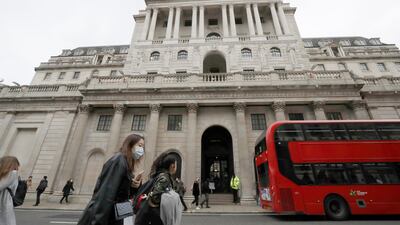The Bank of England maintained its stimulus package and held interest rates at 0.1 per cent on Thursday but signalled that “modest tightening” would be needed as inflation ramps up.
The central bank kept the size of its bond-buying programme unchanged at £895 billion ($1.2 trillion) and the monetary policy committee voted unanimously to hold the benchmark lending rate at a record low of 0.1 per cent, 16 months after the lender first made the interest rate cut.
However, with the lender expecting inflation to surge to 4 per cent by the end of this year, MPC official said some adjustment would be required in due course to keep price growth under control.
“The economy is projected to experience a more pronounced period of above-target inflation in the near term than expected in the May Report,” the BoE said in a statement.
“Some modest tightening of monetary policy over the forecast period is likely to be necessary.”
Britain's economy has rebounded quickly since restrictions were first eased in March after suffering its biggest fall in output in more than 300 years last year.
While the BoE reaffirmed its expectation that the economy will rebound by 7.25 per cent this year, the recovery slowed sharply in July to its weakest level since March as supply-chain bottlenecks and rising worker absences caused by Covid-19 isolation rules hampered business activity.
However, inflation was enough of an issue for the MPC's Michael Saunders to vote for stimulus to wind down as soon as possible, with the committee member in favour of ending the BoE’s net asset purchases £45bn short of the £895bn target.
His stance was overruled by the rest of the eight-member MPC, who said higher inflation will be mostly transitory, though they flagged the need to take their foot off the stimulus pedal to meet their 2 per cent inflation target “in the medium term.”
“We expect above-target inflation to be temporary. We don’t think that demand will continue to rise as fast, and some of the shortages that are currently making it difficult for businesses to produce their products should ease,” the BoE said.
“We expect inflation to fall back, reaching our target in around two years’ time.”
Britain’s inflation rate hit 2.5 per cent in June - the highest rate in almost three years - as Covid restrictions were eased further, however the BoE insisted it would not tighten monetary policy until spare capacity is eliminated and the bank’s inflation target is met sustainably.
The Bank also suggested that it now intends to reduce the stock of purchased assets by ceasing to reinvest maturing assets when Bank Rate has risen to 0.5 per cent instead of the previous target of 1.5 per cent.
“By talking about the mechanics of tightening policy, that is another signal that tightening is drawing nearer,” said Ruth Gregory, senior UK economist at Capital Economics.
“While the MPC’s policy statement sent a signal that higher interest rates are on the horizon, we still think it’s more likely that the MPC continues to sit tight until the middle of 2023 before tightening policy.”
The central bank said it would also be paying close attention to the labour market with expectations that unemployment will drop to 4.25 per cent in the fourth quarter of next year.
While the Bank noted that the stock of vacancies has increased along with difficulties in matching available jobs and workers, it recognised there was uncertainty about how the economy will adjust to the end of the furlough scheme later in the year.
Ed Monk, associate director of personal investing at Fidelity International, said the labour market remains key with recent wage rise and unemployment data turning out stronger than expected.
“That points to a broad-based rise in demand that may not recede as the economy recovers from the pandemic,” he said.
The FTSE 100 responded to the Bank of England report by dropping 0.2 per cent over concerns about the inflation spike.
Meanwhile, the pound was up 0.21 per cent to $1.3918 at 12.55pm London time.
“Sterling has experienced massive volatility on the back of the BOE’s meeting even though nothing was changed,” said Naeem Aslam, chief market analyst at Avatrade.
“However, the message isn’t fully digested in the market, and this is bringing significant whipsaw move for the currency. The bank has made it clear that the case of negative interest rates are still on the table but if we look at the sterling’s price action, traders aren’t buying that stance.”


